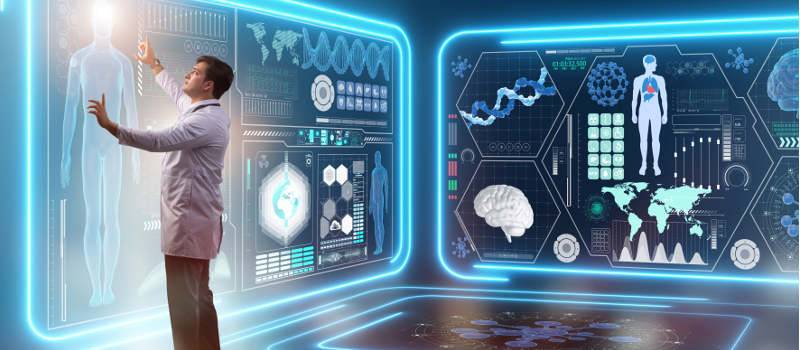Have you heard the movie Big Hero 6? It’s an animated movie in which this guy named Tadashi built AI machine Baymax, the inflatable healthcare robot, which could be very in army camps and place where the medical sector is not up to the mark but there is a plot twist it was later turned into a war machine by his younger brother. The whole idea of telling this is that the concept shown in it is now a reality that would come into effect in the coming years. AI is something that has drastically put an impact on our ways of working like if we take ourselves a few years back then no one can think of payment doing through the internet or buying things by just watching their pics that is what online shopping is. AI is making everything more effective, available to all and most importantly it does not have any boundaries.

The healthcare sector and the knowledge associated are complex. Health check-ups, today, are not just limited to checking the patient’s temperature or asking questions. With the amplified number of complex diseases, even technology has to get more advance. Modern tests, complex medication processes, and restful treatment require high-end technologies for better healthcare industry. This where AI is making its way through in the medical industry because it can bring a drastic effect on the healthcare sector in many ways –
DEVELOPMENT OF RADIOLOGY TOOLS
Radiological images obtained by MRI machines, CT scanners, and x-rays offer non-invasive visibility into the inner workings of the human body. But many diagnostic processes still rely on physical tissue samples obtained through biopsies, which carry risks including the potential for infection.
Artificial intelligence will enable the next generation of radiology tools that are accurate and detailed enough to replace the need for tissue samples in some cases, experts predict.
MAKING PATHOLOGY IMAGES MORE PRECISE
Pathologists provide one of the most significant sources of diagnostic data for providers across the spectrum of care delivery, says Jeffrey Golden, MD, Chair of the Department of Pathology at BWH.
“Seventy percent of all decisions in healthcare are based on a pathology result,” he said.
Somewhere between 70 and 75 percent of all the data in an electronic health record are from a pathology result. So, the more accurate we get, and the sooner we get to the right diagnosis, the better we’re going to be. That’s what digital pathology and AI have the opportunity to deliver. Analytics that can drill down to the pixel level on extremely large digital images can allow providers to identify nuances that may escape the human eye.
ADVANCE WEARABLES AND PERSONAL DEVICES FOR MONITORING HEALTH
Almost all consumers now have access to devices with sensors that can collect valuable data about their health. From smartphones with step trackers to wearables that can track a heartbeat around the clock, a growing proportion of health-related data is generated on the go. Collecting and analyzing this data – and supplementing it with patient-provided information through apps and other home monitoring devices – can offer a unique perspective into individual and population health. Artificial intelligence will play a significant role in extracting actionable insights from this large and varied treasure trove of data.
SMARTPHONES AS POWERFUL DIAGNOSTIC TOOLS
Continuing the theme of harnessing the power of portable devices, experts believe that images taken from smartphones and other consumer-grade sources will be an important supplement to clinical quality imaging – especially in underserved populations or developing nations. The quality of cell phone cameras is increasing every year and can produce images that are viable for analysis by artificial intelligence algorithms. Researchers in the United Kingdom have even developed a tool that identifies developmental diseases by analyzing images of a child’s face. The algorithm can detect discrete features, such as a child’s jawline, eye and nose placement, and other attributes that might indicate a craniofacial abnormality. Currently, the tool can match the ordinary images to more than 90 disorders to provide clinical decision support.
Not just this but AI will be upgrading the health care industry in way more than this, completely changing it for. AI will begin the new chapter in the health care industry, it will change the traditional method of treatment and analysis. The doctor will able to treat their patient in a much more effective way, as AI will reduce the pressure on them. The doctor will be less likely to say, “they can’t help them it’s too late” to their patient. Who knows that one day will come and just like in the home, where we’re using Alexa, the future will bring virtual assistants with embedded intelligence to the bedside for humans to use for any medical problem.
Many would say that at the end of the day AI is just manmade creation, there will be some flaw in it, we can’t fully trust them, there can be any glitch in it, or what doctor can do AI will never be able to do. In the modern world with the existence of a pandemic situation, AI will be never able to take the place of a doctor but with the assistance of AI, a doctor will able to handle the situation more efficiently and with up gradation in modern technology, they will be well prepared of a situation like covid-19, hope it will never come in future. At last, AI will usher in a new era of mankind and exciting breakthroughs in the human world, since today AI and machine play a very important role in every human’s life, nowadays it is becoming as important as water for living.
Blackcoffer Insights 29: Mayank Gupta, Netaji Subhas University of Technology




